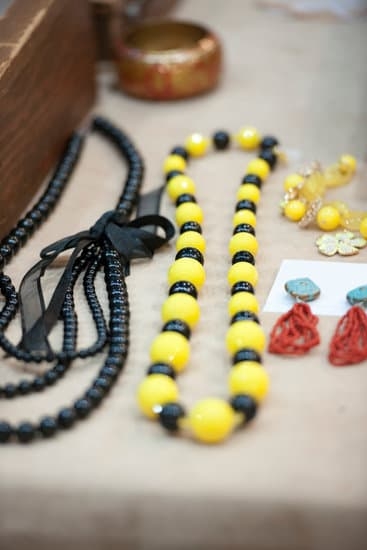Are you passionate about creating beautiful, unique jewelry pieces? Have you ever considered turning your hobby into a small business? In this article, we will explore the exciting world of starting a small handmade jewelry business. From finding your niche and perfecting your craft to setting up shop and building a strong customer base, we will provide you with valuable insights and tips to help you succeed in the handmade jewelry industry.
Starting a small handmade jewelry business can be a fulfilling and profitable venture for creative individuals. With the growing demand for one-of-a-kind, artisanal products, there is no better time to tap into this thriving market. Whether you want to sell your creations online or open a physical storefront, there are endless opportunities to showcase your talent and connect with customers who appreciate the artistry and craftsmanship of handmade jewelry.
In the following sections, we will delve into the essential steps and considerations for aspiring jewelry entrepreneurs. We will discuss how to identify your unique selling point, source quality materials, improve your jewelry-making skills, navigate the legal requirements for starting a small business, and more. So if you’re ready to turn your passion for creating beautiful jewelry into a successful business venture, keep reading for expert advice on how to start a small handmade jewelry business.
Finding Your Niche
When starting a small handmade jewelry business, finding your niche and identifying your unique selling point is crucial for success. Your unique selling point is what sets your handmade jewelry apart from the competition and attracts potential customers. Here are some steps on how to find your niche and identify your unique selling point:
1. Research the market: Before diving into the handmade jewelry business, research the market to understand the current trends, customer preferences, and popular styles. This will help you identify gaps in the market that you can fill with your unique designs.
2. Assess your skills and passion: Take stock of your skills, interests, and passions to determine what sets you apart as a jewelry maker. Do you have a signature style or technique that makes your pieces stand out? Use these unique attributes to define your niche.
3. Identify target audience: Determine who your target audience is and what they are looking for in handmade jewelry. Consider factors such as age, gender, lifestyle, and fashion preferences when defining your niche.
Once you have identified your niche and unique selling point, incorporate them into all aspects of your business including product development, branding, marketing, and customer interactions to create a cohesive brand identity that resonates with your target audience.
Sourcing Materials
When starting a small handmade jewelry business, one of the most important aspects is sourcing high-quality materials for your creations. The materials you use will determine the overall quality and appeal of your jewelry, so it’s essential to find reliable suppliers. Here are some of the best places to find quality supplies for your handmade jewelry business:
1. Local Craft Stores: Many craft stores carry a wide range of beads, findings, and other jewelry-making supplies. Visiting these stores in person allows you to see and feel the materials before making a purchase.
2. Online Marketplaces: Online platforms such as Etsy, Amazon, and eBay offer a vast selection of beads, gemstones, and metal components for making jewelry. You can also find unique and hard-to-find materials from international suppliers on these platforms.
3. Wholesale Suppliers: Establishing relationships with wholesale suppliers can help you access bulk quantities of materials at discounted prices. Look for wholesale suppliers specializing in jewelry-making supplies to reduce your production costs and increase your profit margins.
4. Gem Shows and Trade Fairs: Attending gem shows and trade fairs allows you to source unique gemstones and materials directly from manufacturers and wholesalers. These events also provide opportunities to network with other artisans and learn about the latest trends in the industry.
By strategically sourcing your materials from these various avenues, you can ensure that your handmade jewelry stands out in terms of quality, creativity, and craftsmanship.
Please note that when sourcing materials for your small handmade jewelry business, it’s crucial to consider factors such as cost, quality, availability, and uniqueness. By carefully selecting where you obtain your supplies from these different sources mentioned above without compromising quality or integrity getting creative with both traditional resources like craft stores while being open-minded about what less conventional venues may offer.
Perfecting Your Craft
Invest in Quality Tools and Materials
One of the first steps to improving your jewelry-making skills is to invest in high-quality tools and materials. The right tools can make a significant difference in the quality and precision of your work, while using unique and high-quality materials can help set your handmade jewelry apart from mass-produced pieces.
Look for suppliers that offer a wide range of unique beads, gemstones, and findings, and don’t be afraid to experiment with new materials to expand your skillset.
Take Advantage of Resources
Whether you’re just starting or have been making jewelry for years, there are always opportunities to learn new techniques and refine your skills. Take advantage of online tutorials, workshops, and classes offered by experienced artisans. These resources can provide valuable insights into different jewelry-making processes, such as wire-wrapping, metal stamping, or bead weaving. Additionally, joining local crafting groups or online communities can also offer support and guidance as you continue to perfect your craft.
Practice Regularly and Experiment
As with any craft, practice makes perfect. Set aside time each day to work on new designs or techniques. Don’t be afraid to experiment with different styles or methods – sometimes the most unique designs come from taking risks and trying something new. Keep a sketchbook or journal where you can jot down ideas for future projects and track your progress as you continue honing your jewelry-making skills.
By following these tips for improving your jewelry-making skills, you can elevate the quality of your handmade pieces and take your small business to the next level as a skilled artisan in the competitive handmade jewelry market.
Setting Up Shop
When starting a small handmade jewelry business, one of the most important decisions you’ll have to make is whether to set up an online store or a physical storefront. Both options have their own unique advantages and challenges, and the choice will ultimately depend on your target market, budget, and personal preferences.
Online Store
Setting up an online store for your handmade jewelry business can be a cost-effective way to reach a global audience. With the rise of e-commerce platforms like Etsy, Shopify, and Amazon Handmade, you can easily create a professional-looking website to showcase and sell your products.
Additionally, selling online allows you to work from home and save on overhead costs such as rent and utilities. You’ll also have the flexibility to manage your business at your own pace.
Physical Storefront
On the other hand, opening a physical storefront for your handmade jewelry business can provide a more personal and immersive shopping experience for customers. A brick-and-mortar store allows customers to see and touch your products in person, which can help build trust and credibility for your brand.
Additionally, having a physical location can attract foot traffic and local customers who prefer shopping in-store rather than online. However, it’s important to consider the higher overhead costs associated with renting or buying retail space.
Ultimately, whether you choose to start an online store or physical storefront for your handmade jewelry business will depend on factors such as your target market, budget constraints, and long-term goals for your brand. Many successful jewelry entrepreneurs find success in blending both online and offline strategies to maximize their reach and customer base. Experimenting with different sales channels may help you discover what works best for your unique business.
Marketing Your Brand
Building a strong online presence is crucial for the success of any small handmade jewelry business. In today’s digital age, potential customers are more likely to discover and purchase from businesses with a strong online presence. Here are some effective strategies for marketing your brand and building a strong online presence:
First, create a visually appealing and user-friendly website to showcase your handmade jewelry products. Make sure to include high-quality images, detailed product descriptions, and an easy checkout process to provide a seamless shopping experience for your customers.
In addition to your website, leverage social media platforms such as Instagram, Facebook, and Pinterest to expand your reach and engage with potential customers. Post regularly, interact with your followers, and use relevant hashtags to increase visibility for your brand.
Another important aspect of building a strong online presence is creating valuable content such as blog posts, DIY jewelry tutorials, or behind-the-scenes videos that resonate with your target audience. This will not only establish you as an authority in the handmade jewelry industry but also drive traffic to your website through search engines.
Finally, consider collaborating with influencers or participating in online marketplaces and craft fairs to further promote your brand and reach new customers. By implementing these strategies, you can effectively market your brand and build a strong online presence for your small handmade jewelry business.
| Effective Strategies | Building a Strong Online Presence |
|---|---|
| Create visually appealing website | Showcase high-quality images |
| Leverage social media platforms | Engage with potential customers |
| Create valuable content | Establish authority in the industry and drive traffic to website |
| Collaborate with influencers and participate in online marketplaces | Promote brand and reach new customers |
Pricing Your Products
When it comes to pricing your handmade jewelry, there are several factors you need to consider in order to determine the right prices for your products. One important aspect to take into account is the cost of materials. Calculate the expenses for all the materials used in each piece of jewelry, including beads, wires, clasps, and any other components.
It’s also essential to factor in the time it takes to make each item – from design to completion. Calculate an hourly rate that reflects your expertise and the time spent on each piece.
In addition to material and labor costs, you should also research the market and analyze your competitors’ prices. Take note of the average prices for similar handmade jewelry items within your niche. This will help you understand how much customers are willing to pay for products like yours and position your pricing competitively.
Furthermore, don’t forget about overhead costs such as packaging materials, shipping expenses, marketing costs, and any fees associated with selling platforms or storefronts. All these considerations will contribute to determining the final price of your handmade jewelry pieces.
Lastly, keep in mind that while it’s crucial to cover all your expenses and make a profit, setting reasonable prices is equally important in attracting customers. The perceived value of handmade jewelry often justifies a higher price point compared to mass-produced items. Therefore, it’s essential to find a balance between covering costs and offering a price that customers are willing to pay for unique and high-quality handmade jewelry.
| Factors | Considerations |
|---|---|
| Cost of Materials | Calculate expenses for all materials used including beads, wires, clasps |
| Time Spent on Each Piece | Determine an hourly rate that reflects your expertise |
| Market Research | Analyze competitors’ prices & understand customer willingness-to-pay |
| Overhead Costs | Include packaging, shipping expenses & fees associated with selling platforms or storefronts |
Legalities
When starting a small handmade jewelry business, it is essential to understand the legal requirements that come with owning and operating a business. The first step in this process is to determine the legal structure of your business, whether it be a sole proprietorship, partnership, LLC, or corporation. Each structure comes with its own set of benefits and requirements, so it’s important to research and decide which one best suits your business goals.
Once you have chosen a legal structure for your handmade jewelry business, the next step is to register your business with the appropriate government authorities. This may include obtaining a business license, tax identification number, and any permits required for selling jewelry in your area. It is crucial to comply with all local, state, and federal regulations to avoid any legal issues down the line.
In addition to registering your business, you will need to keep detailed financial records and stay up-to-date with tax obligations. This includes tracking income and expenses related to your jewelry business and filing taxes accurately and on time.
It may be helpful to consult with a professional accountant or tax advisor to ensure that you are meeting all legal financial requirements for your small handmade jewelry business. Understanding these legalities from the start will set you up for success and protect your business in the long run.
In summary, understanding the legal requirements for starting a small handmade jewelry business is crucial for ensuring compliance with government regulations and avoiding potential legal issues. Researching the legal structures available, registering your business, maintaining accurate financial records, and staying compliant with tax obligations are all key components of running a legally sound operation. By taking these steps early on in your entrepreneurial journey, you can set yourself up for success as you grow your small handmade jewelry business.
Building a Strong Customer Base
Firstly, it’s important to create a unique brand identity that sets your handmade jewelry business apart from the competition. This could be through the use of distinctive designs, a compelling brand story, or exceptional customer service. By identifying what makes your brand special, you can effectively communicate this to potential customers and capture their attention.
Another key aspect of building a strong customer base is to engage with your audience on social media and other online platforms. Utilize visually appealing content to showcase your products, interact with followers, and respond to their inquiries promptly. Building an online community around your brand can foster customer loyalty and encourage repeat purchases.
Lastly, offering exceptional customer service is vital for retaining customers. Make sure to provide a seamless purchasing experience, offer personalized recommendations, and follow up with customers after their purchase. By consistently delivering excellent service, you can turn one-time buyers into loyal advocates for your small handmade jewelry business.
Conclusion
Starting a small handmade jewelry business can be an exciting and rewarding venture. By following the tips and guidelines outlined in this article, you can set yourself up for success in the competitive market of handmade jewelry. Finding your niche and unique selling point, perfecting your craft, setting up shop, marketing your brand, understanding legal requirements, and building a strong customer base are all essential steps to creating a successful handmade jewelry business.
One of the most important aspects of starting a small handmade jewelry business is finding your niche and unique selling point. This will help you stand out in the market and attract customers who are looking for something specific and unique. Whether it’s using sustainable materials, incorporating personalized elements, or designing for a specific demographic, identifying what makes your jewelry special will set you apart from the competition.
In addition to finding your niche, perfecting your craft is crucial to the success of your handmade jewelry business. Continuously improving your jewelry-making skills through practice and learning new techniques will ensure that your products are of high quality and appeal to a wide range of customers.
With dedication and passion for your craft, combined with effective marketing strategies and a strong online presence, you can create a successful small handmade jewelry business that attracts loyal customers and brings you fulfillment as an entrepreneur.
Frequently Asked Questions
How Do I Start a Small Jewelry Business From Home?
Starting a small jewelry business from home requires careful planning and organization. First, determine your niche and target market. Then, obtain the necessary materials and tools, create a business plan, set up an online store, and promote your products through social media and networking.
Is It Profitable to Sell Handmade Jewelry?
Selling handmade jewelry can be profitable if you have a unique selling proposition and are able to differentiate yourself from the competition. Building a strong brand, focusing on quality craftsmanship, and targeting the right audience can lead to success in the handmade jewelry market.
Is a Small Jewelry Business Profitable?
A small jewelry business has the potential to be profitable with the right strategy and execution. By keeping overhead costs low, focusing on quality products, offering excellent customer service, and effectively marketing your brand, it’s possible to generate consistent revenue and grow your business over time.

Welcome to my jewelry blog! My name is Sarah and I am the owner of this blog.
I love making jewelry and sharing my creations with others.
So whether you’re someone who loves wearing jewelry yourself or simply enjoys learning about it, be sure to check out my blog for insightful posts on everything related to this exciting topic!





